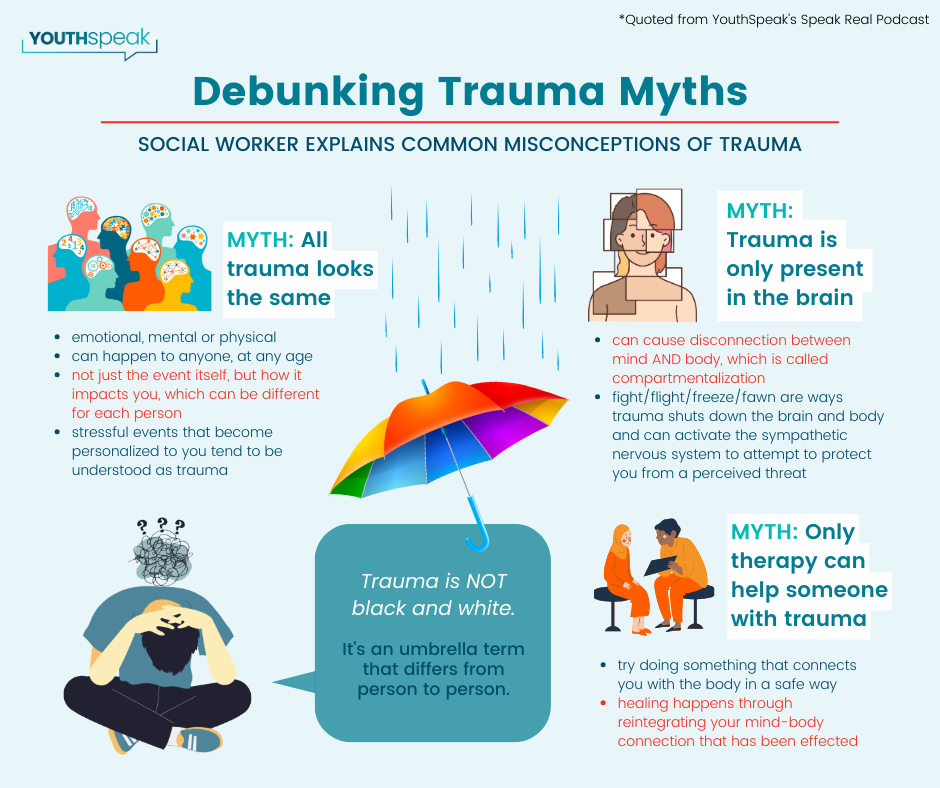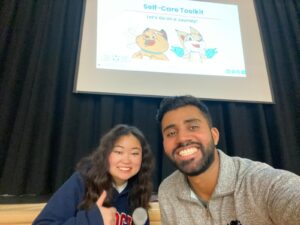On this episode of YouthSpeak’s Speak Real podcast, Christian sits down with Kavita, a clinical social worker with over 15 years of experience, who works primarily with vulnerable populations, especially those challenged by mental health and trauma.
Anyone can have Trauma or PTSD:
When we say trauma, some of us may picture a blunt force trauma. Others may only imagine physical trauma. Kavita thinks of trauma as an umbrella term as it is very broad.
She says,
“Trauma is different for everyone, it can be physical or psychological…Trauma is a very stressful event that is frightening or distressing. Traumatic events can happen at any age, it can happen to anyone.”
Finding Meaning in Struggle
While reflecting on her own experience with anxiety, Kavita says,
“If you are able to find meaning in your struggle, you are able to move forward a little bit”
Kavita says while reflecting on her own personal journey from being diagnosed with anxiety disorder to what helped her navigate it and ultimately becoming a social worker. Finding a purpose has helped Kavita move forward, and it does not have to be grand.
“Find small things you can start with to make the change, you will look back and say that struggle was able to define me.”
Diagnosing Trauma
Kavita explains that while there is no official diagnosis for trauma in the DSM (Diagnostic and Statistical Manual of Mental Disorders), there are different disorders that are linked with trauma, such as:
- Trauma with PTSD (post-traumatic stress disorder)
- Trauma with dissociative personality disorder
“Trauma is just a word and we put meaning to it. Some people are able to get more support because of the diagnosis.”

This support can come in the form of accessing insurance and accomodations in the workplace.
Medication for Mental Health
Medications are preferable for some if they require an immediate intervention.
“Everyone has a baseline. When we are not well emotionally, our baseline is off. If it is too off, it is hard to bring it down. Medication for the time being can help you bring you down to your baseline. Once the baseline is reached, then you do therapy.”
The Connection Between Mental Health and Physical Health
Kavita believes that physical health is often a reflection of our mental health. The roots of physical illnesses can often times come from emotional blockages.
“We have a genetic disposition for how much a baseline we are going to have, which also goes with resiliency. If you are depressed, you feel more physical pain than someone who is happy.”
As such, it is important to pay attention to the cues that physical pain may be signaling, because it might be reflecting an underlying mental health problem.
How Trauma Affects the Brain at a Neurological Level:
Trauma begins in the brain. Each part of the brain has a different function.
“The prefrontal cortex is the only thing that makes us different from animals, because we can actually rationally think about things. This part of the brain comes online after 28-29.”
Kavita says this is why young people are more likely to have difficulty differentiating between a real threat and perceived threat, as the prefrontal cortex is underdeveloped. However, not all hope is lost. Coping strategies can be very helpful for dealing with trauma.
Cost-effective Alternatives when you cannot afford Therapy
Clinical therapy tends to be expensive, which may make it difficult to get access to help. Kavita works at the Scarborough Centre for Healthy Communities which offers free therapy sessions with a doctor’s referral from the area of Scarborough. She recommends listeners look for similar resources in their region.
If you are unable to access clinical therapy, other options include:
- EMDR music/bilateral music. When we are distressed, the left and right hemispheres of our brains do not talk to each other. EMDR music can help to work together and produce a calming effect. Youtube has an abundance of free EMDR music.
- Emotional freedom technique tapping on specific parts of the body can help release stress.
- YouthSpeak’s website also lists many free options of professional mental health services for young people and their parental figures.
There is still so much stigma that exists when we talk about trauma. Kavita emphasizes on the importance of talking to someone, whether it is a therapist or a trusted confidant. Every step forward is a step towards reclaiming strength and resilience.
Watch the full episode here:
YouthSpeak is a charity organization based in the GTA, Canada that conducts assemblies and interactive workshops to help increase the resiliency of youth facing challenges today. To find out more about our projects and initiatives visit https://youthspeak.ca/. Follow our journey on social media @youthspeakCAN Help support our For-Youth-by-Youth projects by donating at: https://www.canadahelps.org/en/pages/i-support-youthspeak/






